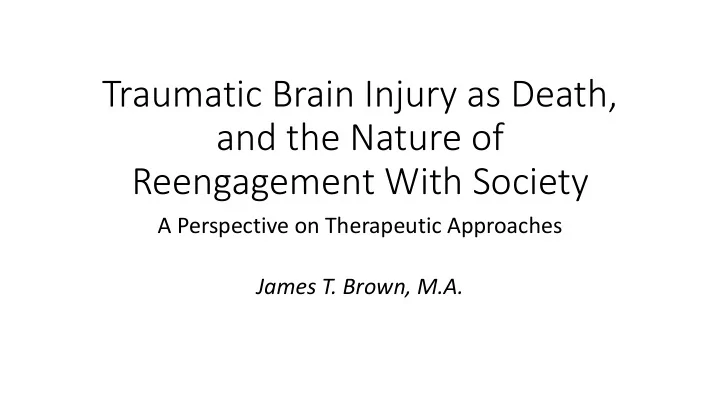

Traumatic Brain Injury as Death, and the Nature of Reengagement With Society A Perspective on Therapeutic Approaches James T. Brown, M.A.
Traumatic Brain Injury as Death
Goal / Application of Presentation: • To understand that traumatic brain injury provides particularly good insight to death / significant disconnection from society. • To better tailor psychological and therapeutic approaches to cases involving traumatic brain injury.
Bio • Traumatic Brain Injury Survivor, 1992 • M.A. Philosophy, University of Illinois, 2010 • Teacher of Philosophy • Continuing Graduate Studies, University of New Mexico • Published Paper - Traumatic Brain Injury as Phenomenological Death Global Journal of Intellectual and Developmental Disabilities , 2017 • Presented Paper - Traumatic Brain Injury Calls For An Expanded Metaphysics - Southwest Conference of Continental Philosophy, 2018 • Board of Directors, Brain Injury Alliance of New Mexico
Bio, Pre-TBI • Newly Married – Recent Move from Colorado to California • Law Student, Pepperdine University • Strange Symptoms – Tumor Diagnosis • Assurance of Simple Removal – My Belief that this was a “Speed Bump” • “Plucking a pickle out of a jar.” • Easy, back to law school in a month
Bio – TBI • More Complicated Tumor Removal Than I Was Led to Believe • Severe Bleeding in Brain • Survival, Two month coma, Intensive Care • Four Month Hospitalization, Extensive Rehabilitation • Inability to Return to Law School • Physical Disability • Cognitive Acuity Remained • SITBI – Refers to this particular situation – But commonalities can be drawn
Basic Concepts of Philosophy • Philosophy analyzes what it means to be human • This changes in brain injury • Metaphysics – The nature of reality • Epistemology – The nature of knowledge
Phenomenology – Branch of Philosophy • Phenomenology is the study of experience and how we experience . • Phenomenology is a method of philosophical inquiry , in which reality consists of objects and events ( "phenomena" ) as they are perceived or understood in the human consciousness … The Basics of Philosophy https://www.philosophybasics.com/branch_phenomenology.html • Phenomenology affects the nature of reality (metaphysics), and the nature of knowledge (epistemology).
Phenomenology - Application • Developed largely by the German philosopher Martin Heidegger • Largely applicable to psychology and brain injury • Martin Heidegger’s phenomenology provides methodological guidance for qualitative researchers seeking to explicate the lived experience of study participants. • Methodological Guidance – Begs the question: “What is human ‘being’?”
Human “Being” • Phenomenology is the study of experience and how we experience . • Phenomena - Our lived experience • Each human is unique - Has different lived experience • Heidegger - Defines what is fundamentally a part of all humans • By examining this, we are able to discern the effects of phenomena
Human “Being” - Thrownness • A human being finds itself with characteristics that shape its engagement with the world. • So-Foundedness – A human is “thrown” into the world – The human has particular talents, desires, abilities … • Interested in law, good at academics, a husband, likes outdoor activities … • These characteristics are not chosen by the human, but rather are the factual situation the human finds itself in. • Interested in law, good at academics, a husband, likes outdoor activities …
Human “Being” - Mood • A human being has a particular way of being “attuned” to the world. (How the human is aware of the world it lives in) • Dispositions, aims, desires, skills, and particular ways of making sense of the world. • Particular Mood – Anxiety – The human being is aware that s/he is an individual, separated from all other individuals.
TBI – Rethrownness • A human being finds itself with characteristics that shape its engagement with the world. • Rethrown / Characterized by TBI • Interested in authenticity, philosophy and academics, an individual, a dog owner … • There are some similarities - As I am “familiar” with my former self • All in a Much Different Way
TBI - Radical Anxiety • Heidegger’s Anxiety on Steroids • Survivors have been accustomed to a certain role in society, and have been “recast” to a different role within the same society.
Death Defined • Traditional Concept of Death - Demise • Physiological Termination • Global Collapse of “Projects” • Phenomenological Death • Global Collapse of “Projects” • One must live through this death – to witness this “global collapse” • SITBI - Fits Here
Pre-TBI – Life “Projects” • Newly Married – Recent Move from Colorado to California • Law Student, Pepperdine University • Physically Active • Pre-Professional Life • Future as a Professional • Activities • Friends
Post-TBI – Life “Projects” • Intentionality – Disappeared in favor of a reactive existence • Sudden dependence • Fundamental Change in Marriage Relationship • No longer a traditional husband, but now a recipient of care • Very Ill-Equipped for Parenthood • Physical Change • No longer able to participate in many physical activities I enjoyed • Part of my enjoyment stemmed from the way I was able to participate in activities • Pre-Professional activities / friendships ended • 15 Year Period of Finding Direction – 1992-2007
Current – Life “Projects” • M.A. Philosophy • Teacher of College Philosophy • Father of a 20-year-old Daughter • Research / Writing of Philosophy • Brain Injury Alliance of NM – Board Member – Head of Web / IT
TBI - Rethrownness – Radical Anxiety • Thrownness – Life “Projects” - First 24 years of life • Rethrownness – Post-TBI • Heideggerian Anxiety - First 24 years of life • Radical Anxiety - Post-TBI
A Better therapeutic approach • Global Collapse of “Projects” – A survivor of TBI has “Died”. • They have witnessed their life as they knew it collapse • Futile to talk as if a survivor is going to “Get back to their previous self” • Therapeutic approach: • Phenomenology / Existential Psychology
Recommend
More recommend